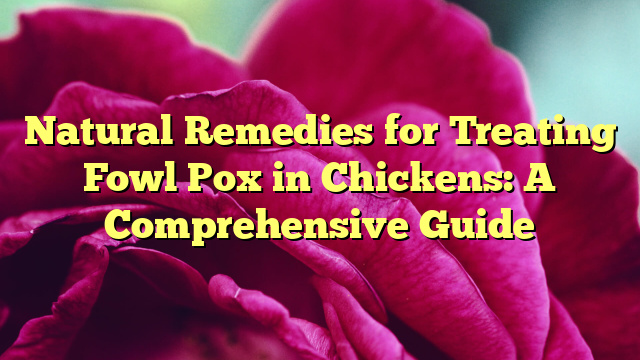Natural Remedies for Treating Fowl Pox in Chickens: A Comprehensive Guide
Natural Remedies for Treating Fowl Pox in Chickens: A Comprehensive Guide
Fowl pox is a common viral disease affecting chickens, characterized by lesions on the skin and, in its severe form, the mucous membranes of the mouth and throat. While vaccines are available, many poultry keepers prefer natural remedies for treatment and prevention. This comprehensive guide explores various natural strategies to manage and treat fowl pox in chickens.
Understanding Fowl Pox
Before diving into the remedies, it’s crucial to understand the basics of fowl pox. The disease manifests in two forms: dry pox and wet pox. Dry pox appears as wart-like lesions on unfeathered skin, while wet pox affects the bird’s respiratory tract, leading to difficulty breathing and eating.
Transmission and Symptoms
- Transmission: Fowl pox spreads through direct contact with infected birds, by mosquitoes, or through scratches and cuts on the skin.
- Symptoms: Symptoms include lesions on the skin, diphtheric membranes in the mouth, lethargy, and reduced egg production.
Natural Remedies for Fowl Pox
Natural remedies can help manage symptoms and support the immune system of affected birds. Here are some effective treatments:
Boosting Immunity with Supplements
Enhancing the chicken’s immune system is crucial for fighting off the virus. Supplements like vitamin A, vitamin E, and selenium can be beneficial.
Topical Treatments for Lesions
Applying natural antiseptics can help heal the skin lesions more quickly and prevent secondary infections. Aloe vera gel and honey are excellent options for their soothing and antimicrobial properties.
Herbal Remedies
Certain herbs have antiviral and immune-boosting properties that can be helpful in treating fowl pox. Echinacea, garlic, and turmeric can be added to the chickens’ water or feed.
Preventive Measures
Prevention is always better than cure. Here are some strategies to prevent the spread of fowl pox in your flock:
Maintaining a Clean Coop
Regular cleaning and disinfecting of the coop and equipment can reduce the risk of fowl pox transmission.
Controlling Mosquito Populations
Since mosquitoes can transmit the virus, controlling their population around your poultry area is essential. Use mosquito traps and remove standing water where mosquitoes breed.
Quarantine New Birds
Quarantining new additions to your flock for at least 30 days can help prevent the introduction of fowl pox and other diseases.
Dietary Considerations
A healthy diet plays a vital role in preventing and fighting off diseases like fowl pox. Ensure your chickens have access to a balanced diet rich in vitamins and minerals.
Recommended Nutrients
| Nutrient | Benefits | Sources |
|---|---|---|
| Vitamin A | Supports skin health and immune function | Carrots, sweet potatoes, leafy greens |
| Vitamin E | Antioxidant that supports immune health | Almonds, spinach, sunflower seeds |
| Selenium | Works with Vitamin E to enhance immune function | Seafood, Brazil nuts, eggs |
Conclusion
While fowl pox can be a challenging disease to manage, employing natural remedies and preventive measures can significantly help in controlling its spread and impact on your flock. Remember, a healthy diet, clean environment, and vigilant care are your best tools in keeping your chickens happy and healthy.
Further Reading and Resources
For more detailed information on fowl pox and natural poultry care, consider consulting veterinary texts on avian diseases, joining poultry farming forums, and reaching out to local agricultural extension services.

